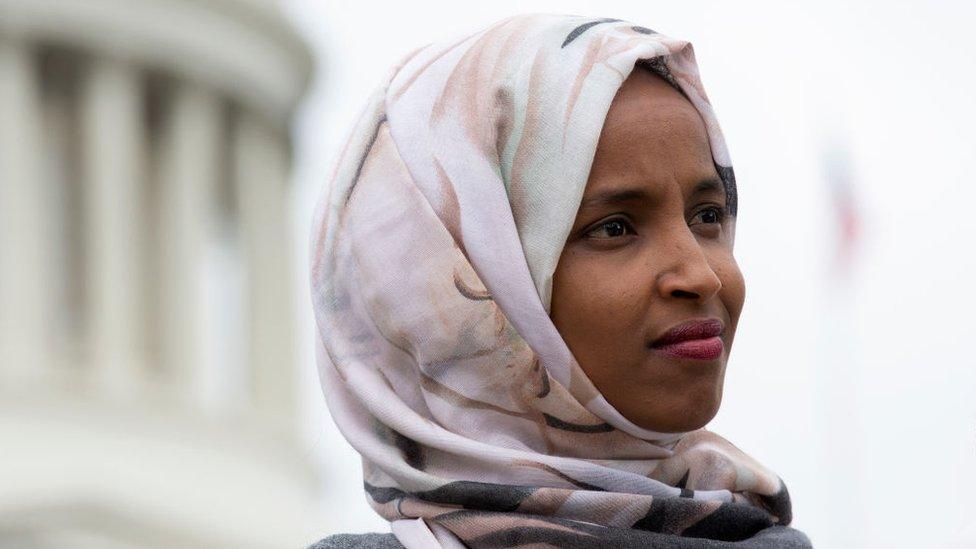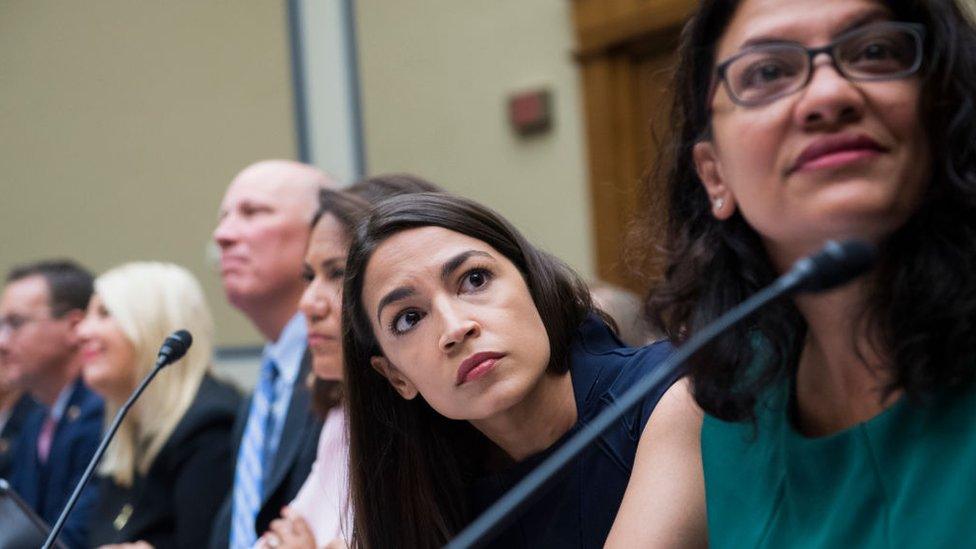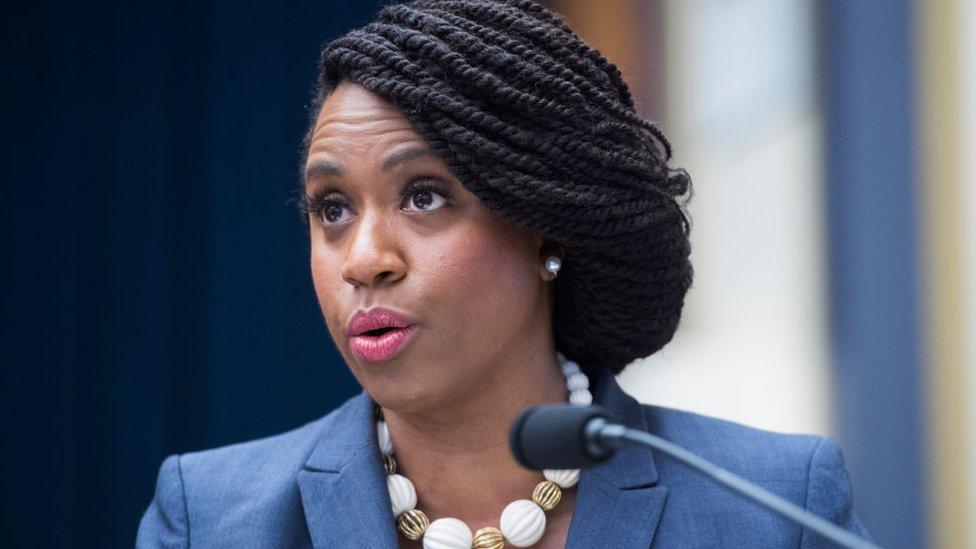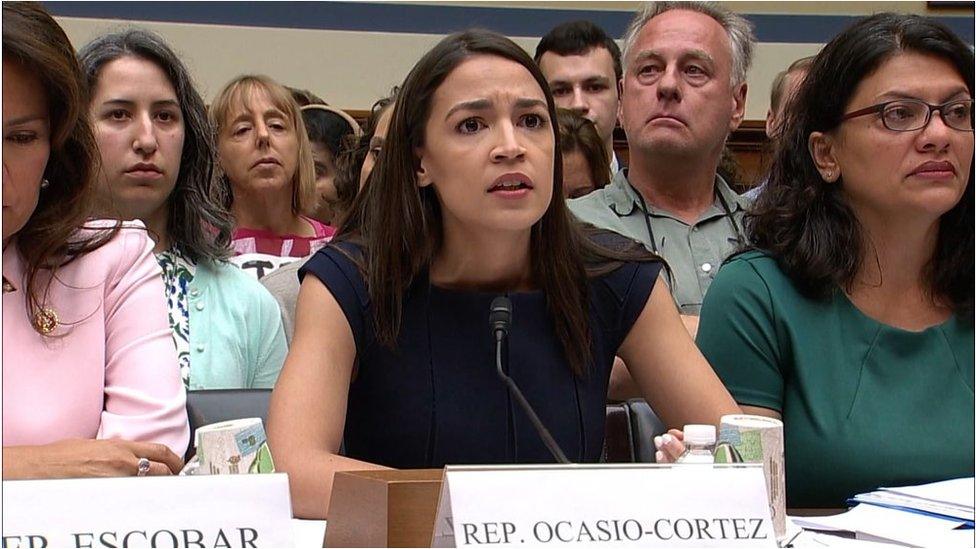AOC, Omar, Pressley, Tlaib: Who are 'the squad' of congresswomen?
- Published
Democratic congresswoman Rashida Tlaib: "I'm dealing with the biggest bully I've ever had to deal with"
The ongoing row between US President Donald Trump and four non-white Democratic congresswomen has continued to escalate following a controversial campaign rally.
During a speech in North Carolina, Mr Trump took aim at Representatives Alexandria Ocasio-Cortez, Rashida Tlaib, Ayanna Pressley as well as Ilhan Omar, a Somali-born lawmaker who he focused much of his criticism on.
His rhetoric prompted a chant of "send her back" from his supporters, which Mr Trump on Thursday claimed he disagreed with.
The rally fallout follows debate over a series of vitriolic tweets and statements by the president that have been widely condemned as racist.
All the women are US citizens. So what else do we know of the lawmakers known as "the Squad"?
All four were elected to the House of Representatives in last November's mid-term elections, each making history as a result.
Known to be progressive, they have clashed in recent weeks with the more pragmatic Speaker of the house, Nancy Pelosi - divisions with racial overtones that Mr Trump has tried to exploit with his tweets.
Ilhan Omar

Ms Omar speaks at a news conference in Washington DC in June
First-term congresswoman Ilhan Omar won a Minnesota seat in the House of Representatives last November, becoming the first Somali-American legislator in the US.
Her family first came to the US as refugees from Somalia, settling in Minneapolis in 1997 after fleeing the country's civil war. She became a citizen in 2000.
The 37-year-old mother of three is one of the first two Muslim women ever elected to the US Congress.
Before her election to Congress, she served in Minnesota's state legislature, making her the then highest elected Somali-American public official in the US.
Ms Omar's precedent-setting tenure has earned both adoration and criticism.
Shortly after her election, she drew praise for fighting to change a 181-year ban on headwear in the House, allowing her to wear a hijab for her oath of office.
But Ms Omar has also faced repeated accusations of anti-Semitism.
She was forced to apologise for a series of tweets in February that suggested that the American Israel Public Affairs Committee (Aipac) was buying influence for pro-Israel policies.
Lawmakers on both sides of the aisle said the tweets stoked anti-Semitic tropes about Jews and money.
Ms Omar later released a statement "unequivocally" apologising for her tweets.
"Anti-Semitism is real and I am grateful for Jewish allies and colleagues who are educating me on the painful history of anti-Semitic tropes," Ms Omar wrote.
Ilhan Omar on her journey to becoming the first Somali-American lawmaker in the US
She came under fire from conservatives again in April for comments on 9/11 that Democrats said were taken out of context.
A clip of Ms Omar apparently describing 9/11 as "some people did something" began circulating online, and the president tweeted a video showing footage of the terrorist attacks spliced with Ms Omar's speech.
The quote was from a speech Ms Omar gave to a civil rights group, the Council on American-Islamic Relations (Cair), in March. The comments in Mr Trump's video were taken from a point she made about the treatment of US Muslims in the aftermath of the 11 September attacks:
"For far too long we have lived with the discomfort of being a second-class citizen and, frankly, I'm tired of it, and every single Muslim in this country should be tired of it. Cair was founded after 9/11 because they recognised that some people did something and that all of us were starting to lose access to our civil liberties."
In recent weeks, Mr Trump has focused his attacks on Ms Omar saying she "hates Israel" and "hates Jews", and suggesting she supports the jihadist group al-Qaeda.
US media reported that Mr Trump's accusations probably reference a 2013 interview where Ms Omar was discussing a college terrorism class.
She did not praise al-Quaeda in the interview. Ms Omar remarked that a professor said the names of terrorist groups with a different kind of "intensity" compared with the tone he used when he said "America" or "England".
Alexandria Ocasio Cortez

Ms Ocasio-Cortez and Ms Tlaib at a House Oversight and Reform Committee hearing
Alexandria Ocasio-Cortez, often referred to as AOC, made waves in the Democratic Party last June when she defeated political veteran and establishment favourite Joe Crowley in their party's primary in a new York district.
The 29-year-old went on to beat Republican candidate Anthony Pappas in the November mid-terms, becoming the youngest ever US congresswoman.
The freshman lawmaker was born in the Bronx, New York to parents of Puerto Rican descent. She has a degree in economics and international relations from Boston University, and worked as a community organiser, educator and bartender before deciding to run for office.
Since her election, the self-described democratic socialist has become a lightning rod for the political right.
Ms Ocasio-Cortez has not shied away from the spotlight, frequently taking to social media to hit back at Republicans, members of the media and other critics on a range of issues including immigration, poverty and race.
Alexandria Ocasio-Cortez on detained migrants: 'The women were told to drink out of a toilet bowl'
She has earned a reputation for her impassioned testimonies at congressional hearings, which are often re-circulated among her nearly five million Twitter followers.
She has been particularly vocal in her push for environmental policy, serving as one of the sponsors of the Green New Deal resolution, which calls upon the US to reach net-zero greenhouse gas emissions along with other goals.
Ms Ocasio-Cortez has also been outspoken in her criticism of the president, saying there is "no question" that Mr Trump is racist.
And she recently accused Ms Pelosi of "singling out" new congresswomen of colour following a number of clashes over their policy stances.
Social media savvy, Ms Ocasio-Cortez inadvertently coined the term "the squad" after suggesting they hashtag a photoshoot image of the four of them #squadgoals.
Rashida Tlaib

Ms Tlaib and Ms Omar talk before Mr Trump's second State of the Union address
Much like the other congresswomen, Rashida Tlaib's election this November made history.
The Michigan Democrat is the first Palestinian-American woman to serve in Congress. Born and raised in Detroit, Michigan, Ms Tlaib is the daughter of Palestinian immigrant parents. Her grandmother still lives in the West Bank.
She was sworn into office wearing a traditional Palestinian garment stitched by her mother.
Ms Tlaib also joined Ms Omar as one of the first two Muslim women ever elected to serve in Congress.
The eldest of 14 siblings, Ms Tlaib became the first member of her family to graduate from high school, and then from college and law school.
Since assuming office, Ms Tlaib has been an outspoken critic of the president. She courted controversy when she used explicit language when calling for the president's impeachment.
Allow X content?
This article contains content provided by X. We ask for your permission before anything is loaded, as they may be using cookies and other technologies. You may want to read X’s cookie policy, external and privacy policy, external before accepting. To view this content choose ‘accept and continue’.

Ms Tlaib was unapologetic about the furore incited by her remark, tweeting that she would "always speak truth to power".
After his twitter storm, she said Mr Trump was "biggest bully I've ever had to deal with in my lifetime", and said his attacks were a "distraction" from her job of representing people in her congressional district.
Ayanna Pressley

Ms Pressley at a House Financial Services Committee hearing
Congresswoman Ayanna Pressley, 45, is the first African-American woman to be elected to the US Congress from Massachusetts.
Born in Cincinnati and raised in Ohio, Ms Pressley is the only child of a single mother.
After attending Boston University, she served as a senior aide to Congressman Joseph P Kennedy II, and worked for Senator John Kerry for 13 years.
Her own political career began in 2009 when she waged a successful bid for a seat on Boston City Council, becoming the first woman of colour elected to the council in its 100-year history.
Similar to Ms Ocasio-Cortez, Ms Pressley's election to the US Congress involved a major political upset: she unseated 10-term Democratic congressman Michael Capuano in their party's primary.
Since assuming office in January, Ms Pressley has been a vocal advocate of abortion rights, pushing to repeal an amendment that prevents Medicaid from covering abortions for low-income Americans.
A survivor of sexual violence, Ms Pressley has also spoken up for better protections for assault victims, writing on her website that "the people closest to the pain should be closest to the power".
She said she could not call Mr Trump the president, only the "occupant" of the White House.
"He does not embody the principles, the responsibility, the grace, the integrity of a true president," she told CBS.
- Published12 July 2019

- Published7 November 2018

- Published5 January 2019

- Published27 June 2018
